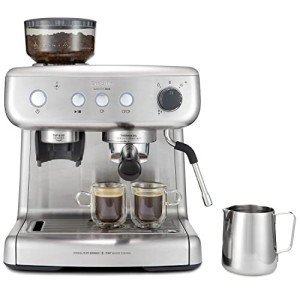9 Signs That You're A High-Quality Espresso Machines Expert
The World of High-Quality Espresso Machines: A Comprehensive Guide
Espresso has ended up being a beloved beverage among coffee lovers worldwide, understood for its rich taste, intense aroma, and adaptability. The heart of a great espresso depends on the machine utilized to brew it. High-quality espresso machines are designed to provide the best shot, making them a necessary financial investment for coffee lovers. This post checks out different types of high-quality espresso machines, their functions, upkeep tips, and responses to often asked questions.
Types of High-Quality Espresso Machines
High-quality espresso machines fall into numerous classifications, accommodating different preferences, skill levels, and spending plans. The main types include:
Type of Machine
Description
Suitable User
Manual Espresso Machines
Needs user ability to manage extraction and pressure. Offers Latte Machines over the brewing process.
Experienced baristas and enthusiasts
Semi-Automatic Machines
Integrates manual operation with automation. Users control the grind and tamping, while the machine manages water dispersion.
Intermediate users
Automatic Espresso Machines
Automate the brewing procedure, permitting programmable developing times and temperature levels.
Casual coffee drinkers
Super-Automatic Machines
Have built-in mills and are completely automated, dealing with everything from grinding to developing and steaming.
Users looking for convenience
Commercial Espresso Machines
Created for high volume use in coffee shops and dining establishments, providing durability and speed.
Company owner
Detailed Overview of Each Type
Manual Espresso Machines
- Pros: Complete control over the brewing process; can produce extraordinary quality espresso.
- Cons: Requires substantial ability; time-consuming.
Semi-Automatic Machines
- Pros: Balanced control, blending manual and automatic processes; remarkable quality espresso is still achievable.
- Cons: Requires some knowledge and experience to master.
Automatic Espresso Machines
- Pros: User-friendly; minimizes the finding out curve while still producing high-quality espresso.
- Cons: Still requires some understanding of coffee-making basics.
Super-Automatic Machines
- Pros: Maximal convenience; little skill required; perfect for people or households who want coffee without fuss.
- Cons: Higher price point; may do not have the fine-tuning capabilities of manual machines.
Commercial Espresso Machines
- Pros: Built for longevity and performance; often consists of features for high-volume turns.
- Cons: Expensive; might be overkill for home use.
Secret Features to Consider
When searching for a high-quality espresso machine, a number of essential features must be considered:
- Pressure and Pump Type: Look for machines with at least 9 bars of pressure, which is vital for extracting the best taste from coffee beans.
- Boiler Type: Single, double, and heat exchanger boilers each affect how the machine carries out and the speed of brewing.
- Construct Quality: High-quality materials such as stainless steel are more suitable for resilience and looks.
- Relieve of Use and Cleaning: Some machines require comprehensive cleansing, while others are designed for easy maintenance.
- Temperature Control: Consistent temperature level is critical; consider machines with PID controllers for precise control.
Advantages of High-Quality Espresso Machines
Purchasing a high-quality espresso machine offers a plethora of benefits:
- Superior Quality: High-end machines enable higher control, leading to tastier espresso.
- Sturdiness: Built to last, quality machines require fewer repair work and replacements.
- Modification: Users can delight in a customized experience by adjusting grind size, shot timing, and other settings.
- Increased Convenience: Automatic and super-automatic alternatives permit aficionados to delight in espresso with minimal effort.
Upkeep and Care for High-Quality Espresso Machines
To keep an espresso machine functioning optimally, regular maintenance is essential. Here are suggestions for preserving a high-quality espresso machine:
Descale Regularly:
- Use a descaling option every couple of months to prevent buildup of minerals from water, which can impact flavor and performance.
Tidy the Brew Group:
- For machines with a detachable brew group, tidy it routinely to guarantee a tidy extraction.
Change Water Filters:
- Use a water filter and change it as needed to reduce impurities in your brewing water.
Daily Cleanings:
- Rinse the portafilter and group head after each use to prevent oil buildup.
Keep an Eye on the Parts:
- Monitor seals, gaskets, and other parts for wear and tear and replace them as needed.
Frequently Asked Questions (FAQs)
1. What is the very best espresso machine for newbies?
For novices, a semi-automatic machine typically supplies a great balance of usability and control, enabling users to discover the abilities necessary for making great espresso.
2. Are super-automatic machines worth the financial investment?
Yes, for those who prioritize benefit and ease over control, super-automatic machines can be a worthwhile investment, particularly for households or hectic experts.
3. How much should I anticipate to invest in a high-quality espresso machine?
High-quality espresso machines vary substantially in price, with manual machines beginning at a few hundred dollars, while super-automatic or commercial machines can surpass several thousand.
4. Can I make other coffee drinks with an espresso machine?
Yes, many espresso machines have steam wands or accessories that allow users to create lattes, coffees, and more.
5. For how long do espresso machines usually last?
With appropriate maintenance, high-quality espresso machines can last over a decade, making them a long-term financial investment in your coffee pleasure.
High-quality espresso machines yield a transformative coffee experience, whether enjoyed in your home or in a commercial setting. By understanding Steam Espresso Machines , their features, and the maintenance required to keep them running efficiently, consumers can make educated decisions that elevate their coffee-drinking experience.
